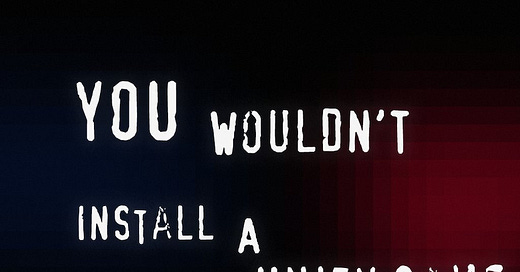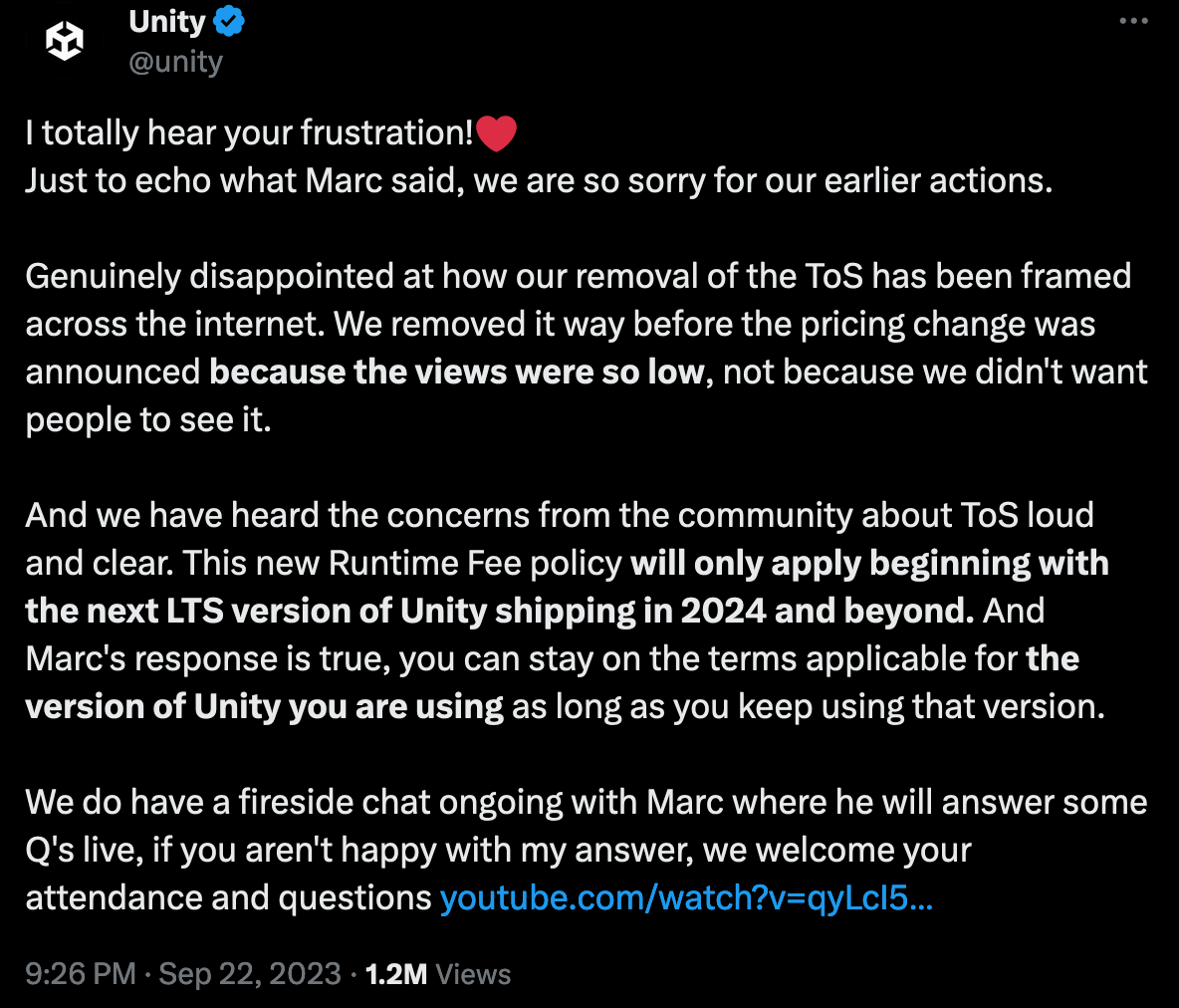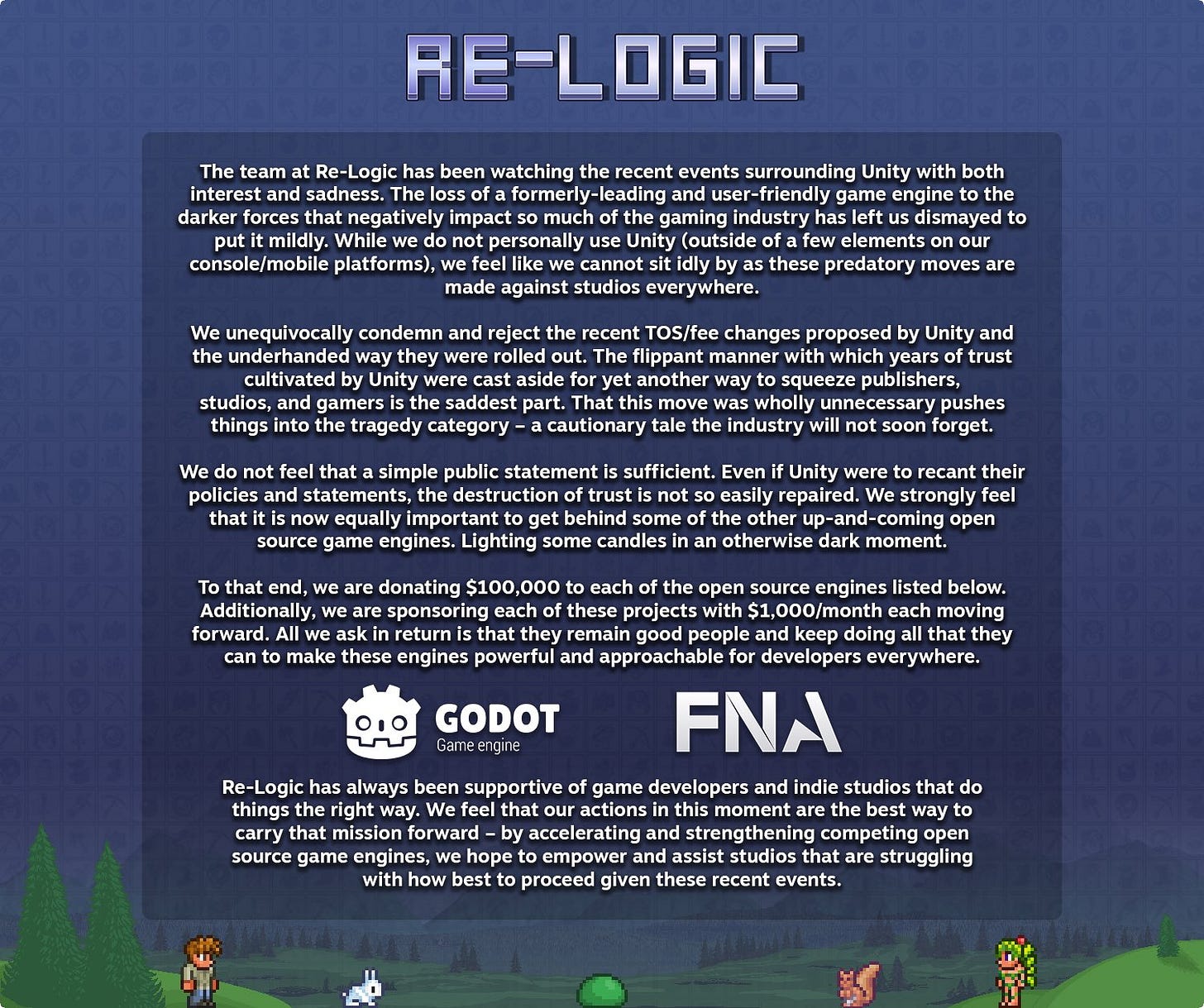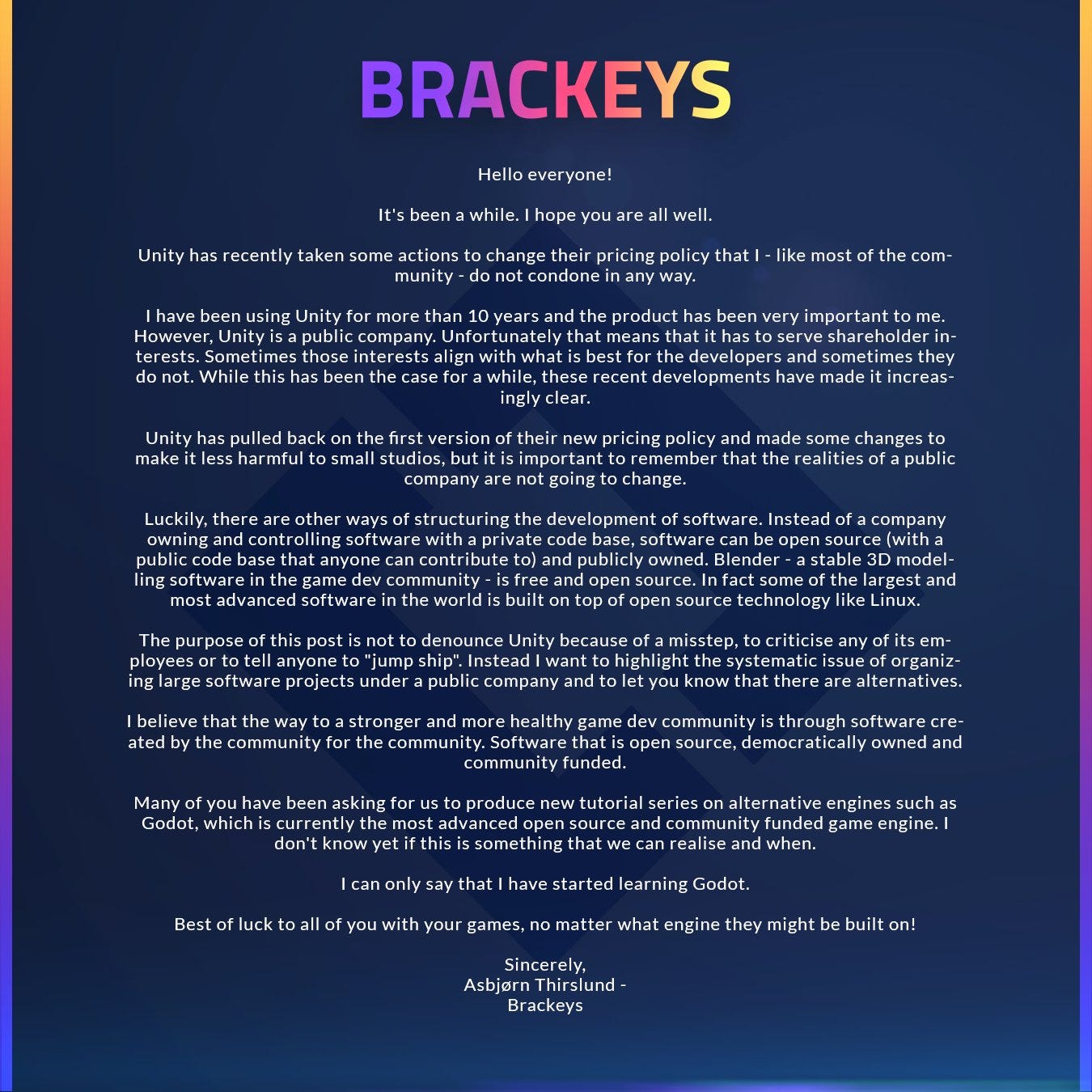It’s been a very noisy few weeks in the world of game development, after Unity - the long-time engine of choice for indie devs, freelancers, students and small studios - decided to bundle up all of the (admittedly never exceptionally stable) community good-will it had accumulated over the years, and kick it into a blender by announcing a new fee structure with no warning, and drastic implications.
Let’s Make a Mess!
The problem, according to Unity (the company), is that Unity (the game engine part of the company) is not profitable. The solution, apparently cooked up by people with candy floss for brains, was to start charging game developers a fee based on the number of installs of their game - the ‘Unity Runtime Fee’ - in addition to licensing fee changes and revenue share arrangements.
Whilst developers would always grumble over increased costs for licensing or imposition of revenue-sharing models - the per-install fee was received as an offensive, poorly planned over-reach - and that’s putting it politely.
Obvious questions were raised:
How are installation metrics calculated?
What happens when Unity’s figures don’t align with a developer’s figures?
Who is liable for the per-install fee - developers themselves, or publishers & platform-holders?
What protections are in place to prevent bad actors from simply installing a game millions of times and drowning a developer in fees?
What happens when a user uninstalls a game to save space, and reinstalls it later?
What about games which are delivered as part of a charity or promotional bundle - where the developers themselves may never receive any payment?
Satisfactory answers were not forthcoming, and so, in true 21st-century fashion, the game-dev internet exploded in fury. Developers were outraged. Much gnashing of teeth occurred. Studios and publishing platforms began issuing statements announcing their frustration and demanding answers. Indie devs declared that they were switching engines for current and future projects.
Rust creator tells Unity to "get fucked" as developers left seething by new install fee - gamedeveloper.com
SideQuest’s Official Response to Unity’s New Runtime Fee - medium.com/sidequestvr
Slay the Spire developer pledges to ditch Unity unless controversial charges plan reversed - eurogamer.net
Among Us Dev Criticizes Unity Runtime Fees - gamerant.com
Though it’s hard to argue that Unity should be prevented from making a profit, the imposition of the Runtime Fee - and the subsequent failure to communicate with developers impacted by it - has certainly secured a place in history as being one of the Worst PR Moves Ever. For almost two weeks, Unity’s embattled social media team tried, pointlessly, to respond to developers and the wider game-dev community, armed with nothing but, presumably, caffeine and prepared statements.
Predictably, every response invited further prodding and mockery. The lack of concrete answers to basic questions such as ‘How does Unity know how many people install my game?’, and ‘What happens if my game is successful and the runtime fee bankrupts me?’ led to Unity being variously accused of installing spyware on people’s devices, sacrificing privacy for greed, breaking numerous data protection laws, and opening up entirely new and novel attack vectors for malicious people to infect customer’s machines and bankrupt studios by running installer-bots. Enough hyperbole was generated to power the internet outrage factory well into the waning days of September. At its core, the runtime fee exposed two major issues:
Developers could not easily plan for install-related costs, and were left angry and worried about their ability to weather the cost if a game actually became successful (which may be an incredibly unlikely problem to have, but not one without precedent - and every indie dev dreams of, and hopes for, a viral hit).
Unity announcing such a change in this way, and with such poor follow-up, severely damaged trust and forced developers to rethink their relationship with the engine.
There was also significant concern over the ‘retroactive’ nature of these changes, with Unity’s wording suggesting that games released prior to the imposition of the runtime fee would also be affected. It didn’t help that Unity had, for a hilarious & nonsensical reason, removed from their GitHub repository the Terms of Service which protected developers from retroactive changes: a change which had actually occurred long before the fee imposition. Nevertheless, it become another stick with which to beat the now-dessicated remains of the Unity social media team.
Console game developers were particularly irked about this issue: when developing a game for a console such as the PlayStation or Nintendo Switch, it’s not always possible for developers to simply choose a particular version of a game engine and stick with it. Instead, they must comply with whichever version of the game engine the console’s SDK supports. This meant that games which were well into development for console release had suddenly had the rug pulled from under them - there was no way to avoid the new fees even though development may have begun years earlier, before they were but a sparkle in Unity’s eye.
It didn’t take long for Unity’s CEO - John Riccitiello - to become the target of much of the ire directed at Unity. Riccitiello himself made headlines in 2022 for calling game developers ‘fucking idiots’ if they didn’t add monetisation to their games beyond the initial purchase price. He later apologised, but this interview, other decisions at Unity, and his history as CEO of EA (it was under his tenure that the controversial decision was made to add loot-boxes to FIFA 09) have done little to persuade the game-dev community that he’s the right person to be steering the ship. There’s also a comically evil leaked recording of Riccitiello on a shareholder call, mooting the possibility of charging players of the extremely popular Battlefield franchise a real-life dollar to reload their fictional guns:
When you are six hours into playing Battlefield and you run out of ammo in your clip and we ask you for a dollar to reload, you’re really not very price sensitive at that point in time.
- John Riccitiello, Joy-Sucking Capitalist
All of this culminated, terrifyingly, in death threats which resulted in Unity closing two of its offices. Police later revealed that the threats were made by a Unity employee, though no further information has been forthcoming thus far.
The Unpology
On the 22nd of September, Unity issued an ‘apology’, in an open letter from Marc Whitten (who, by all accounts, seems to have been thrust into the middle of this debacle through no fault of his own), and clarified some of the issues raised around the runtime fee. Though there was to be no back-tracking on the Runtime Fee itself, Unity have responded more clearly to certain concerns raised, and do appear to have softened their stance a little on data collection - allowing developers to self-report their installation figures rather than simply asserting their own black-box metrics (though they do appear to reserve the right to calculate their own figures and charge you based on those numbers anyway). The issue of retroactivity of the new fees was cleared up - though not particularly satisfactorily: the new fees will only apply once a developer releases an update which happens to use “the next LTS version of Unity shipping in 2024 and beyond”.
What this means, in practical terms, is that Unity games released on an older version of the engine will simply stop being updated much earlier than developers and players would usually expect: which means more bugs and performance issues left unresolved. Unity already suffers from a (some-might-say deserved) reputation for a glut of low-quality games, and I would expect the practical impact of the Runtime Fee to do little to curb that perception.
The community response to the open letter has been guarded at best. Some, like Rami Ismail welcomed the clarifications, though left little doubt that trust had been severely damaged:
Others were rather less enthused - with Among Us and Cuphead developer Tony Coculuzzi stating that it was “Still a terrible change, if slightly better”:
Disappointed too, are asset and tool developers, who have taken the direction of Unity as a sign of things to come.
Freya Holmér, creator of the excellent Shapes and Shader Forge tools, made her exasperation with the situation clear. It’s not certain whether Freya plans to continue supporting the Unity development ecosystem in the future.
Kenney - creator of game assets and starter kits has made clear their intent to support alternative engines, and appears to be full-square behind the open-source Godot engine.
All in all, it’s fair to say that though Unity may have poured a little water on the fire they started, it’s by no means certain that they will be able to restore their relationship with the community, as developers begin looking elsewhere for a more reliable development partner.
Cui Bono?
Though it’s patently clear that Unity has brought upon itself an enormous trust issue - the simple fact remains that many developers and creators are, for the time being, too invested in the engine and its ecosystem of services and tools to cut ties immediately. Unity’s pricing changes bring it closer in-line to the Unreal engine, which means that for future projects, many developers will be comparing the two on a much more equal footing. Whether Unity manages to retain its share of the developer market in the long-term remains to be seen: Epic - the creators of Unreal, have invested heavily in ease-of-use in recent years, but Unity is still regarded as the more accessible engine by many.
In all the noise, open-source engines have seen a groundswell of support as developers explore alternatives to Unity.
Re-Logic, the company behind indie best-seller Terraria - issued a statement expressing their disappointment in Unity’s actions, and donated $100,000 to both Godot and the FNA engine, along with a commitment to donate an additional $1000 per month.
AppLovin, who had attempted to acquire Unity in 2022, released a proof-of-concept tool leveraging OpenAI’s ChatGPT to allow developers to export their Unity game to Godot or Unreal, which is both a middle-finger to their erstwhile partners-to-be, and an interesting test-case for AI’s ability to increase dynamism within the game development process.
Finally, in an unexpected turn of events, Asbjørn Thirslund: the creator of the immensely popular but retired-since-2020 Brackeys YouTube channel - dedicated to providing tutorials and educational content for game developers - today released a statement hinting at a potential return, with a focus on Godot, and echoed some of the sentiment from Re-Logic’s statement:
Brackeys holds a special place in the heart of many Unity developers, and their strong advocacy for Unity over the years, coupled with their accessible and informative tutorial videos and content, has played no small part in Unity’s growth, especially amongst the indie and student communities. Asbjørn’s statement stops short of confirming that Brackeys will be returning, but it’s an encouraging sign for the Godot development community that he is learning his way around the engine - and if Brackeys are able to do for Godot what they did for Unity, then it promises to be an exciting future for open-source game engine development.
Tidying Up
Though it’s been an exciting couple of weeks in terms of raw internet drama, the frustration and alarm caused by Unity’s botched fees announcement led to some ugly real-world consequences. With death threats and development chaos, Unity’s announcement threw a huge spanner in the works for many developers - whether individuals or studios - and has forced them to re-evaluate their business plans, re-negotiate terms with publishers, and reconsider their options. This is a costly exercise in the game development world. Re-tooling and retraining can be an expensive and time-consuming process, and Unity’s poor communication and planning does not imbue the development community with a sense of confidence and stability.
Many developers will continue to use Unity for the foreseeable future - willingly or otherwise - but it’s clear that Unity’s position is a game-changer for many; and the next few months and years will show whether developers are still prepared to play.
Thanks for reading. If you’ve enjoyed this post, why not check out these related posts, in which I explore a little open-source game engine called Tiny:
Tinkering with Tiny
While browsing Hacker News recently, I came across a post about a new game engine called Tiny. The pitch had me intrigued from the get-go: The virtual console that offers an easy and efficient way to build games and other applications with its Lua programming support, hot reloading, and 256-color maximum.
Tiny Gardening
A few weeks ago, I posted an introduction to the Tiny game engine, which you can read at the link below: Since then, I’ve been sporadically working on a little game called Tiny Gardening, which is intended to be something of a re-vamp of one of my first coding projects:

















Informative and fascinating Tom. I hadn't previously seen the gaming development sector as a source of such drama. As you know I have little familiarity with the specialism, but it does seem new options may be opening up in AI support for open source.